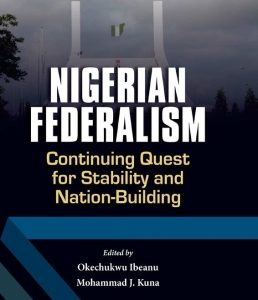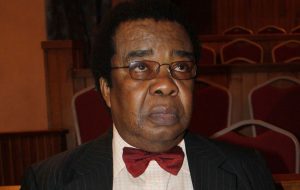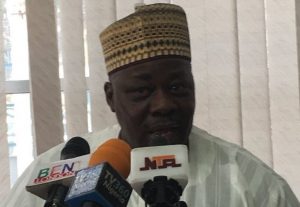Ambassador Usman Sarki, former Deputy Permanent Representative of Nigeria to the United Nations, intervenes in the topic of restructuring Nigeria, bringing another perspective to a long running debate! The concluding part follows shortly. Of course, alternative viewpoints are welcome.
By Amb Usman Sarki
As Nigerians look to the future with great anxiety but much hope as to their fortunes and prospects, it should be borne in mind that there are more grounds for unity than the sporadic impulses towards separation into smaller regional enclaves. They must, therefore, be prepared to make choices about the direction in which their destiny should be driven. It should be acknowledged that the vociferous calls for restructuring and ushering in of “true federalism” whatever this means, belies certain discontents with our system of governance, some legitimate and others spurious.
That notwithstanding, it is retrogressive to call for the dissolution of the federal system because of the mere supposition that it is “not working”. This much can be deduced from the proceedings of the “Colloquium on the Labour Movement and the Future of a United Nigeria: What Role for Restructuring?” That was organised by the Nigeria Labour Congress (NLC) on 23rd August, 2017 in Abuja. Not much discussion was generated by this exceptionally important initiative since then, but it will be wise for progressive forces all across the country, to revisit this singular venture and seek to harmonise positions and outlooks on the unity of Nigeria.

 The “National Question” as far it relates to the federal structure and its operating principles and practices as well as the issue of constitutional arrangements and prerogatives are matters that will remain current and topical for some time as well as of importance to our collective well being. As such, progressive forces especially those aligned to the working class and labour should not be seen to be shying away from engaging in polemics on restructuring of the country.
The “National Question” as far it relates to the federal structure and its operating principles and practices as well as the issue of constitutional arrangements and prerogatives are matters that will remain current and topical for some time as well as of importance to our collective well being. As such, progressive forces especially those aligned to the working class and labour should not be seen to be shying away from engaging in polemics on restructuring of the country.
There are both objective and subjective conditions that have shaped Nigeria’s history and her people’s perception of one another. These, in turn, continue to elicit deep rooted sentiments that often spark off various shades of opinions on matters of governance. This is particularly so in the case of the federal system that we have been practicing. In retrospect, it should be recognised that Nigeria’s federalism is both de facto and de jure as far as its practice is concerned. This should allow us to advocate that Nigeria’s federalism should be both flexible and rigid, in order to adjust to circumstances and accommodate the realities of the country’s needs and political evolution.
It should be rigid in the sense of the absence of any issues or conditions that would make it difficult or impossible for the different constituent units that form the federation to exist side by side, and overcome any apparent obstacles that may arise in the course of the evolution of the system that could threaten its unity and integrity. It should also be flexible enough to accommodate any residual sense of autonomy that each unit might wish to retain, particularly in dealing with local and municipal matters that might be unique or peculiar to each entity.
Therefore, adjusting the requirements of the individual entities with the need for a strong federal system requires astute statesmanship as well as a determination to hold the entities together, by the bond of union founded on the pursuit of common interests of the highest significance to all the parts that form the federation. The essence of “true federalism” if such exists anywhere at all, should therefore be the regulation by consent and universal persuasion, of matters that appear today contentious and irredeemable, by applying yardsticks that are common to all the federating units.
Matters that are hotly contested and therefore, capable of derailing the federal arrangement may, with the passage of time and alteration in circumstances, become little more than a storm in a tea cup and hence of little concern towards achieving a fuller and more mature federal arrangement. It is thus appropriate to suggest that, in a federal system of government, the maxim that says “no condition is permanent” should be the watchword and its vital essence and strength.
In an era when political discourses in Nigeria are largely devoid of deep structural diagnosis and when the subjects of such discourses are clouded by sentiments and are often unrelated to the requirements of nation-building, it behooves upon those with the interest and inclination, and some familiarity with the subject, to provide an alternative thinking on the state of Nigerian federalism. Of late, a cacophony of noises had spread across sections of the country fueled by media interest reaching a state of frenzy, all in the name of “restructuring” the federal set up in Nigeria. Hence in the process, “restructuring or dissolution” has been advocated from one extreme end that sees nothing good in what we have today. The middle ground in the advocacy for restructuring, while maintaining a level-head, latched on nevertheless to the hysteria, often bringing to the fore deeply buried sentiments and motives, layered with ethnic, sectional and religious undertones.
The futile debate on “true federalism” and calls for the enthronement of a regional system of government in the country was met with understandable reticence and skepticism by the vast majority of Nigerians from all sections of the country. Despite the abstruse postulations of the proponents of restructuring, ordinary Nigerians were intelligent and perceptive enough to see through the arguments that were being posited as shallow and devoid of real meaning and content. Nigerians particularly saw the real motive behind the debates as nothing short of an attempt at creating widespread instability in the country that would result in the destabilization of the government and ultimate destruction of the federal system that we have been practicing for so many years.

Prof Bolaji Akinyemi, a tireless voice on federalism in Nigeria

Prof Jibrin Ibrahim, forte on comparative federalism
Those motives were camouflaged under seductive and persuasive arguments and seemingly innocuous formulae like the call to return to the 1967 constitution or the adoption of the recommendations of the 2014 National Conference. In the process of the clamour for restructuring, a heady and volatile mix of demands ranging from resource control and derivation, devolution of powers and creation of more States and Local Government Areas to the establishment of State Police Forces and what not, were advocated. No real or tangible arguments were advanced other than the usual raising of the ethnic and religious dust that Nigerians have become habituated to in the bourgeois elitist posturing that passes for politics in this country. It never dawned on the advocates of “true federalism” and restructuring that all those issues have, at one point or the other in the past, been discussed and resolved in Nigeria’s political and constitutional history.
History, that unerring guide to human conduct and the best instructor about our affairs, was seemingly jettisoned from the discourses or at best turned upside down and put on its head as it suited the inclinations of those deeply steeped in the agitation for restructuring. An honest and objective recourse to history would have pointed the way towards a solution to most of the issues and problems that they raised, as history usually does in most circumstances, and would have instructed us on how to prevent the repeat of mistakes that sometimes prove fatal to our progress and collective well being. Likewise, it is from the lessons of history coupled with calm and mature reflection that we can gather the fruits of wisdom and harvest the benefits of experiences and performances of others in the past, to serve as the signposts for our present and future instruction.
The corrective measures necessary for the progress of societies must be deduced or learned from episodes in history so as to avoid making mistakes that can be easily prevented from the benefit of hindsight. In discussing federalism in Nigeria therefore, a recourse to our country’s history will be of some profit and utility. But first, we must situate the discussion in its proper context by understanding what federalism means. Federalism therefore; is the antithesis of local or ethnic nationalism. Where the two exist, there cannot be a true or an authentic federal system of government. Nationalities be they social, ethnic, religious or others that decide to come together in a union, must first and foremost agree to subsume their individual differences and separate identities, under a larger and all-encompassing supranational identity. Only in that way could they succeed in reaching common grounds and understanding on matters that affect their commonwealth.
The strongest motive force towards federalism is therefore, the conviction to come together and stay as one nation. This therefore entails taking on board all sorts of political bags and baggage and living with different and divergent views and opinions as best each party can. Important and transcendental questions that need common approaches to solve would make it imperative for states and regions to come together, to form a federation for the purpose of achieving some common objectives and deriving general satisfaction in the process. The solidification of the ties and bonds that brought them together over time, will become the surest guarantee of the continuity of the federal arrangement that they have come together to consciously create and nurture.
Nowhere in the world has the system of government based on federalism been fully or finally settled to the complete satisfaction of the members of such an entity. From the United States of America, India, Brazil, Australia, Switzerland, Canada, to Nigeria and South Africa and the rest of Africa where the system is in observance, it is still work in progress, with many issues left to be settled through improvisations and adaptations of the system to varying, evolving interests and concerns. Strengthening the commonwealth in a federal system is achieved by often emphasizing the spirit and not always the letter of the constitution. In that way, matters of common concern can be resolved easily while those proving highly contentious can be accommodated within the framework of the overriding interests of the commonwealth.
In that way also, the common threads that bind all the units together will literally be in the hands of the executive at the center, while the allegiance of the units to the common cause provides the glue that attaches each to its other partners in the federal set up. According to John Buchan, the essence of federalism is full mutual consent. This underlining philosophy meant that the issues of consent and consensus are vital to the success and indeed, ultimate survival of any federal system. The bedrock of federalism is inclusive constitutionalism which, in turn, is guided by accommodating approach to issues that affect every constituent part of the federation that is being established or created.
Decreeing a federal entity by fiat is the height of folly and the most unsound policy, prejudicial to justice and stability in a system of government. As Buchan noted, consent is the key word in federalism and that comes only with understanding, accommodation and acceptance of everybody’s ideas and views regarding how each unit would become a part of the whole and how it would fit into the government structure. Ultimately, the benefits to be derived from such an association matters most to the federating units since their objectives are normally bound by the dictates of self-interest and the assurances and guarantees of their well being and protection within the larger fold of other like-minded entities. Enlightened self-interest is, therefore, another bedrock of federalism.




























